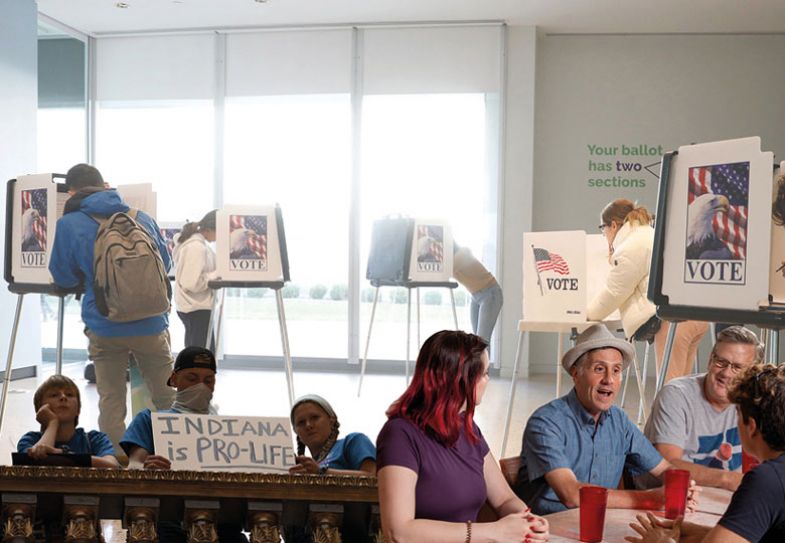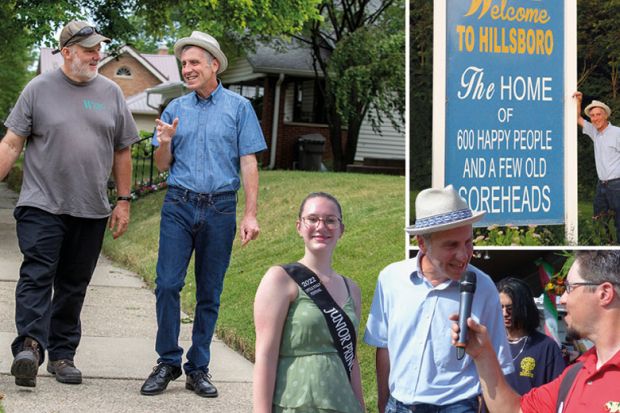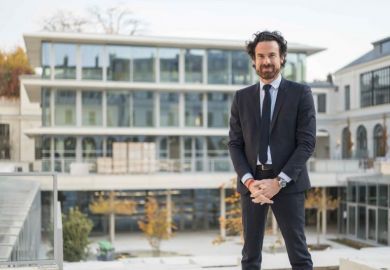“That’s what I look like on a good day!” That bit of self-deprecating levity was pronounced thousands of times in my 2022 campaign for state senate in Indiana as I handed a flyer with my photograph to a potential voter. It almost universally elicited a smile or a laugh from my auditors as I greeted them at their front door or a county fair or while I marched in a parade.
It was not my first time as a professor at Purdue University that I had run for office. Indeed, I have served as an elected city councillor in West Lafayette for seven years. I am a Democrat and have always won my primary elections, even when they were contested, but have been less successful at winning in larger districts that include more rural regions.
One major challenge I faced was that many of the citizens of those areas are not served by local media that cover the campaigns. Another challenge was that in Indiana we have straight-ticket balloting: that is, you can vote by pressing one button, indicating the political party that you favour, and then leave the voting booth without actually having encountered the names of the candidates. A large percentage of Republican voters evade their civic responsibility to learn about the nominees by choosing the straight-ticket option.
Indiana also has remarkably low turnout in elections, with just 41 per cent of registered voters casting a ballot last year. Participation by young people, who tend to be more progressive in their politics, is also poor, especially in contests in which the US president is not being selected, such as November’s election. This apathy is particularly frustrating for a candidate from the academy.
I tried to overcome my demographic disadvantages by meeting with every possible voter. Besides appearing at public events, I went door to door in every town of 300 or more inhabitants, although I focused on households where there were known active voters. I did not restrict my efforts, as many people do, to voters of my political party. I personally knocked on more than 5,000 doors, and my volunteers together nearly equalled that number.
It was remarkable what a positive response I received, with many voters providing encouragement. People expressed their pleasure at meeting a candidate who actually cared enough to greet them at their homes. A large percentage could not recall the last time a state legislative candidate had knocked on their doors; some averred that they had been living in their houses for decades and no candidate had ever been to visit.
My volunteers and I occasionally had unpleasant encounters. Ardent Trump supporters could be particularly rude. At one home, the resident came to the door with a gun. He growled at me, “What do you want?” I responded with my standard introductory line, “I’m David Sanders, and I’m running for state senate.” “Not interested,” was his reply before slamming the door. We were both relieved that the encounter was over.

A remarkable fact – almost all the houses with the “Let’s Go Brandon” signs (a euphemism for “f*** Joe Biden”) and posters depicting Donald Trump as Rambo or picturing him alongside the Confederate flag were not occupied by registered voters but by people who eschewed the political process and were merely in the business of frightening their neighbours. Certainly, there were plenty of Trump supporters among the people I met, but they were for the most part civil.
When it was 38 degrees Celsius, many people offered me a bottle of water when they answered the door. I met thousands of dogs – more than most people will encounter in their entire lives. There was only one remote town where, for reasons that are still unknown to me, cats predominated.
Gnomes were a common feature on front porches. At those homes, I would always deploy my “What do you call time-keeping dwarves in the Paris subway?” riddle. No one ever guessed the answer (Metro-gnome), but they always laughed when they heard it.
In my campaign literature, I included my college degrees and the institutions from which I obtained them, as well as some of my scientific activities and awards. My opponent for some reason refused to identify the institution from which he obtained his degree. There is a theme here, but it’s an interesting alternative approach when there have been numerous cases of politicians around the world being exposed for falsely asserting having received advanced degrees from particular institutions. In one recent similar manifestation that I find ironic, the notorious US representative George Santos actually claimed to have attended the same New York high school as I did (he didn’t).
Scientific credentials were relevant because the Covid pandemic still played a very important role in the 2022 state senate race. The first Republican to announce her candidacy did so on the basis that she had achieved fame as the “Maskless Clerk” who defied 2020 state legal directives to wear a protective face mask when serving voters in her county. She also declared that she was running because God had told her to do so (although, as far as I know, He never told her she would win). It is noteworthy that the per capita death rate from Covid in her county was 2.7 times that in the county in which I dwell.
The Republican Indiana assembly leadership were concerned that an extremist candidate, whose message would resonate with the types of voters who reject vaccination, might become the state senator, so they decided to create a Republican-voter-dominant district, via a decennial redistricting process, that encompassed a considerable portion of the county in which I reside, as well as Purdue University. I learned from numerous people, including a top member of my opponent’s campaign, that the specific goal was to include the home of an acolyte of then-Purdue president and former Indiana governor Mitch Daniels so that they could run against the clerk. In the US, as I have stated on earlier occasions, voters don’t choose their representatives; representatives choose their voters. Even then, however, this individual only won the Republican primary by fewer than 400 votes.
The fear of the Republican assembly leadership was founded on the low Sars-CoV-2 vaccination rates (below 50 per cent) in the rural counties in Central Western Indiana and the attitude towards Covid that they betray. Vaccination rates in the county where I live, in contrast, are more than 60 per cent.
Although numerous people that I met commented favourably about my credentials, there was, as one might expect, more interest sparked by the fact that I teach the Covid-19 course at my university. It covers not only virology and immunology but also history, politics, economics and sociology. A common question was a variation on “Did the virus come from a laboratory in China?” Although there was probably an expectation that I would provide a “yes” or “no” answer, I would, scientist that I am, discuss how there are three main hypotheses about the origins of Sars-CoV-2 (transmission from an animal host, accidental escape from a laboratory setting, or deliberate creation of a modified virus in a laboratory) and how the last two are sometimes confused. I would share that there is no real evidence for the last hypothesis, but that there was insufficient evidence to distinguish definitively between the first two.
If there were persisting attention from my interrogator I would explain that transmission from an animal was most likely, but that there were examples of laboratory accidents resulting in the release of infectious agents, including ones that I had investigated. I always included my assessment that China had failed the world through a lack of transparency. Some people were very interested in my insights, but others were disappointed that the one scientist with whom they would meet did not confirm conspiracy theories.
One woman whom I encountered wasn’t particularly interested in my explanations. At great length she expounded on the evils of counter-Covid measures. It was only after about 10 minutes or so of her harangue that she shared with me that her husband had actually died of the disease. I was stunned by the inability of this individual to learn a lesson from this experience about protecting other members of the public. I subsequently was informed by a colleague that this woman had been a member of a local music group but left because she rejected the group’s vaccination mandate.
A substantial proportion of the district is farmland. A number of my political supporters were farmers, but they were far outnumbered by Republicans, who dominate the farmers’ advocacy organisation. As a life scientist, I was more informed about agriculture and the technologies that are transforming it, but political affiliation was apparently the sole factor that led to the promotion of my opponent's candidacy.
Nonetheless, individual farmers with whom I conversed were transfixed by my description of the potential possessed by new technologies such as CRISPR gene editing to transform agriculture, as well as of the opportunities for Indiana to be at the forefront of those developments if people with the proper vision were in the legislature. As opposed to the previous deployment of genetic engineering, CRISPR has the capacity to create products that actually benefit the consumer and the environment. It is clear from the response I received that my message resonated with those with whom I spoke, but it was hard to reach more of the agricultural community because of the lack of local media.
Nor were my election hopes helped by the fact that I was vastly outspent by my opponent. He was supported by groups trying to divert money from public education (so-called school-choice proponents) and an organisation funded by the climate-change-denying oil-billionaire Koch brothers. Towards the end of the campaign, there was an aggressive online campaign against me that was coordinated with postcards sent to voters that retailed outright falsehoods about my positions as a city councillor.
As a scientist who believes that science offers value to public policy and that communication with the public is an essential component of one’s vocation, I was always eager to share my position on the issues. I reached out to my opponent to arrange joint forums. Various local civic and media organisations offered to host debates between my opponent and myself. I always accepted; my opponent always declined. More generally, I embraced every opportunity to communicate my positions on the issues through the media. My opponent almost inevitably evaded interviews; when he did respond it was through unresponsive written statements.
A particularly salient example of my opponent’s media shyness related to abortion. Following the 24 June overturning of the US constitutional right to abortion, the general assembly of Indiana swiftly passed legislation banning most terminations. This issue became a central differentiator in the campaign. Whenever I was asked, I forthrightly asserted my opposition to the legislation and explained that the basis of my approach was my consistent emphasis on access to healthcare and personal privacy. Despite our being asked directly by members of the media numerous times, my opponent would never state whether he would have voted for the measure, and issued three contradictory statements whose content apparently was crafted for different audiences. Yet although, nationwide, the issue motivated women to go to the polls to protect their freedoms, there was apparently no such impact in Indiana.
I have always attempted to be the type of candidate for whom I would like to vote. Despite my efforts, I was nevertheless not able to overcome straight-party Republican voting in the rural counties. In my county, where the voters were served by local media that covered the campaign and knew the candidates best, I won by a substantial margin.
Despite my defeat, I do not regret all the time I spent travelling and meeting people in a district that spanned more than 75 miles north to south. I learned tremendously from people who were willing to share their stories with me. If nothing else, thousands of people had a smile brought to their face when they met a political candidate who cared about them personally and was willing to make a joke about his appearance. But it is a pity to have it confirmed to me so directly that honesty, openness and expertise apparently count for so little in modern US politics.
David A. Sanders is an associate professor of biological sciences at Purdue University in Indiana.
Register to continue
Why register?
- Registration is free and only takes a moment
- Once registered, you can read 3 articles a month
- Sign up for our newsletter
Subscribe
Or subscribe for unlimited access to:
- Unlimited access to news, views, insights & reviews
- Digital editions
- Digital access to THE’s university and college rankings analysis
Already registered or a current subscriber? Login








